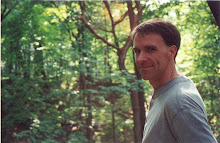
Kevin left, and I waited for people to interview. It was February, and I was not the only tourist escaping the Northern Hemisphere winter. The first two gentlemen I found to interview in front of the painting responded in British accents.
One man had on baggy jeans, and a white T-shirt clung to the roll of his belly. His dark graying hair was teased up tall in front to hide the fact that it was thinning. On his bulbous nose rested rimless thick-lensed glasses. He pushed a wheelchair that held a frail woman with white wispy hair, presumably his mother. Long slim wrists slipped out from her bright red sweater. She faced away from us during the interview and could not crane around to contribute, though she tried.
The other man stood squat and dark, with shaggy gray hair and a gray beard trimmed neatly along chubby jowls. He was draped in a maroon sweater that flared out over his oval tummy, and his jeans tapered back to his thin ankles. The two men were so similar I thought of them as Tweedledee and Tweedledum.
"We're visiting from London," the one in the maroon sweater said in a croaky, effete voice. "We saw a big Hopper exhibition in London a long time ago that came from the Whitney in New York."
"It's a great subtext in all his paintings," the man pushing the wheelchair said in a soft deep voice. "Like something terrible has either just happened or is just about to happen. Some of the New York paintings are very like that. Loneliness. All those people in the theater who've arrived very early for their seats and there's no one else there. There's a great feeling of desolation. Those people, those two [in 
"Americans are often unaware," the first echoed.
"They don't want to deal with it," his friend chimed back.
"Well," interjected his friend, Tweedledee, "Europeans tend to think the glass is half empty, and Americans think it's half full, right? We've lived through enough in Europe to know the dark side of man. And so we love his fresh approach which looks so typically American. 
But yet there's something so cold and lonely about it."
"Someone sitting alone at a diner," Tweedledee mumbled before Tweedledum continued.
"Melancholy."
"Melancholy," repeated the other, "which is the dark side."
Even I had to admit, "I don't think Americans deal with darkness..."
"Don't deal with death properly," Tweedledum interrupted with a sniff, and his mother again tried to twist her head around to us.
"Well, " I said, "What about the dark reality in this very town that democratic elections were recently bypassed so that the current president could be put into power?"
"Yessss," they hissed together, raising their eyebrows and smiling as they sidled away.
20090104
113 West Palm, FL: Tweedles
Subscribe to:
Post Comments (Atom)




No comments:
Post a Comment